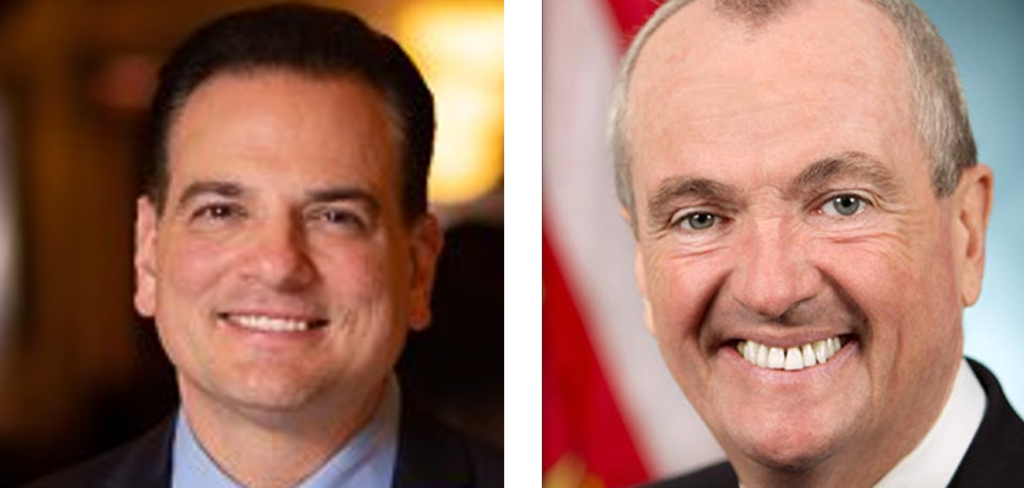Scutari Versus Murphy

More than a month has gone by since the Senate Democratic leadership warned Gov. Phil Murphy that his proposed budget was in jeopardy unless he agreed to reinstate the Legislature’s participation in deciding distribution of $3.2 billion in Federal American Rescue Plan funds to combat the economic distress caused by the COVID pandemic.
The Administration’s stonewall remains firmly in place and the governor has refused to respond directly to questions raised concerning his striking the legislative role language from his fiscal 2022-23 budget proposal.
Senate President Nicholas Scutari (D-Union) and Budget Committee chair Sen. Paul Sarlo (D-Bergen) both described the restoration of the Legislature’s oversight function as “non-negotiable,” and threatened to withhold consideration of the budget until the Administration acquiesced.
Murphy fell back on his customary expressions of confidence that the disagreement will be resolved --- the language he uses in one iteration or another whenever faced with differing views.
In this instance, though, the legislative leadership doesn’t seem to be in a negotiating mood, unwilling to give ground or accept any solution short of their demands.
Their line in the sand position: Either the language –- included in the current budget --- is restored or consideration of the spending plan for the fiscal year starting July 1 will grind to a halt.
There is, they argue, no fall back position, no plan B. Erosion of the Legislature’s constitutional authority to appropriate funds and direct their use is an attack on their institutional responsibilities and will not be tolerated.
Scutari could not have been more direct or more politically blunt: “The legislature will have a say in the disbursement of the COVID funds or we will not have a budget.”
By allowing the disagreement to drift aimlessly without addressing it and remain contentious to the point of risking a politically damaging budget stalemate and government shutdown, Murphy has invited questions and criticism of his motives.
Not surprisingly, the standoff has sparked suggestions that Murphy wants to create a $3 billion slush fund which he alone controls to use in doling out favors in the 2023-2024 election cycle.
Term-limited through 2025, Murphy --- absent legislative oversight --- would be free to direct funds to all manner of local programs to aid Democratic legislative candidates next year or to create entirely new state spending initiatives to --- according to his more cynical critics --- build a national profile in anticipation of a move toward greater influence in the 2024 presidential and congressional election.
Murphy has often described himself as the most progressive governor in the country, a characterization interpreted by many as his attempt to align himself with and gain the confidence of the faction of the Democratic Party committed to massive expansion of social programs as the key to national dominance.
A move in that direction by using $3 billion in Federal funds rather than raising state taxes will enable the governor to boast of his progressive bona fides with little if any adverse impact on New Jersey’s beleaguered taxpayers.
Murphy has consistently disclaimed any interest in seeking national office but, like most in high profile positions, such disavowals are viewed with considerable skepticism.
The Administration’s defense that the governor is merely exercising prudence in allocating the Federal funds, pointing out that the state has until the end of 2024 to allocate the money which must be spent by the end of 2026, is not a particularly strong one.
Nor is it an adequate justification for obstructing the Legislature’s traditional involvement in the appropriations process.
His Administration has been routinely accused of autocratic behavior, of dictatorial one-person governance and a lack of transparency. To be sure, much of it is partisan but in the current dispute over the Federal funds, it has been the top Democrats in the Senate who’ve led the charge.
Their case was bolstered by the National Association of Budget Officers which, in a statement, said the majority of states spend the money in a collaborative legislative/executive process while only a handful give sole authority to the governor.
Moreover, the leadership points out, Murphy apparently felt the oversight language was sufficiently important to include in the current budget but inexplicably eliminated it from his proposed budget for the forthcoming year.
New Jersey received $6.24 billion in American Rescue Plan funds and has spent $3 billion on a wide array of recovery efforts and programs.
By his seeming intransigence, Murphy has created a harmful political drama needlessly and added fuel to the speculative fires concerning his future ambitions.
His argument about exercising prudence in fiscal matters won’t really wash in light of his support for legislative oversight last year.
There seems no valid administrative or effective government rationale to abandon a similar process this year. Aside from the Administration’s calculation that gubernatorial control of disbursing billions of dollars will benefit him, nothing has changed; the ground hasn’t shifted.
Any recommendations to spend the remaining $3.2 billion in Federal funds will be the subject of negotiations between the Governor and the Legislature, as are many other spending items which may be controversial because of cost or policy.
Legislative leadership certainly appears dug in om the issue. A threat to push government past the constitutional deadline for a budget to be in place is not idle chatter and cannot be taken lightly.
Should that develop, however, it will be the governor’s baffling stonewalling that will receive the blame.
Carl Golden is a senior contributing analyst with the William J. Hughes Center for Public Policy at Stockton University.





